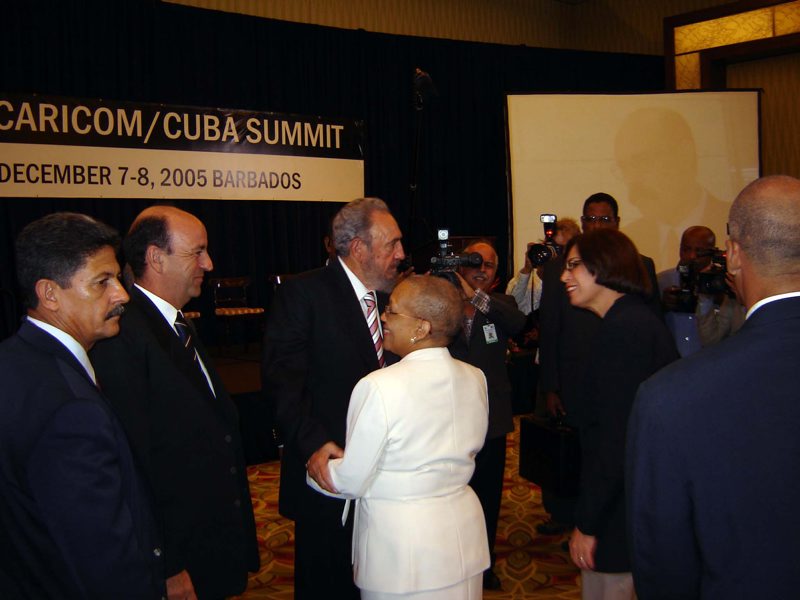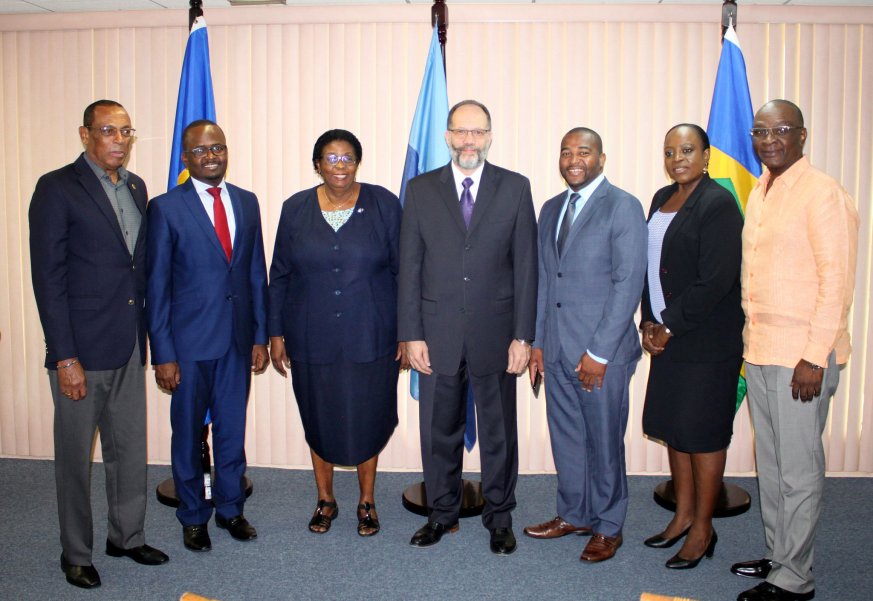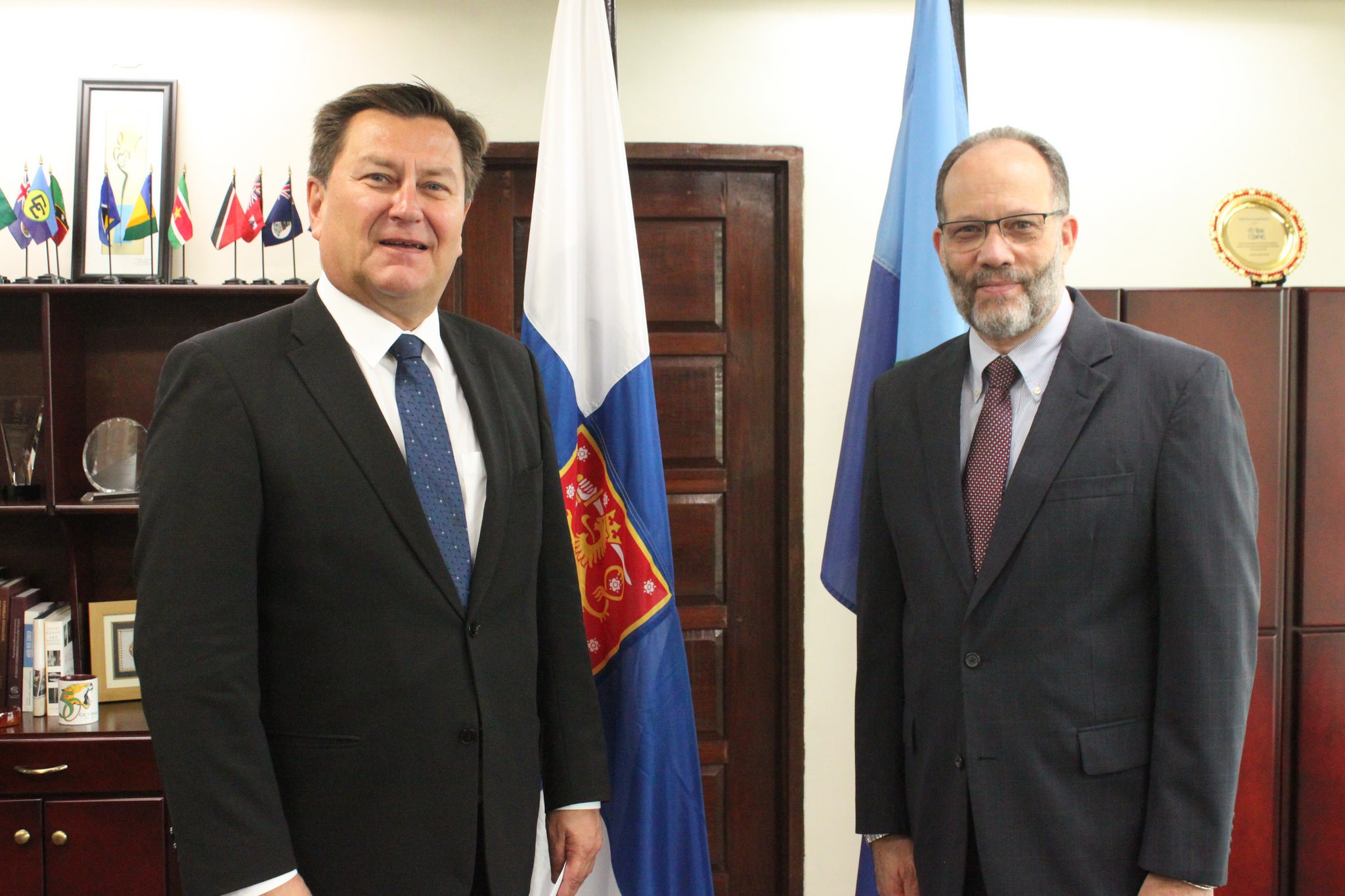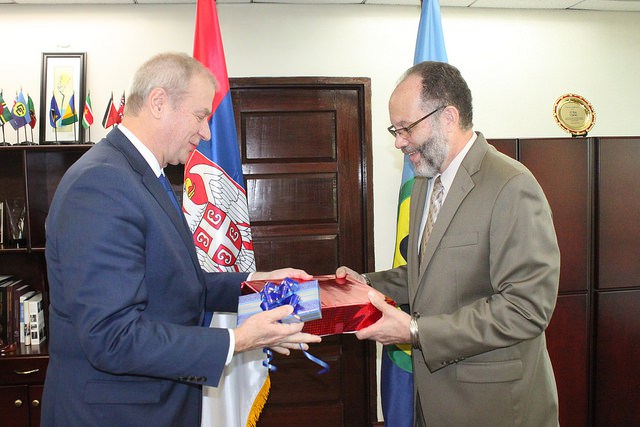The Caribbean Community (CARICOM) is diversifying and widening its foreign policy thrust in response to shifts in balance of powers as well as the dynamic and fluid changes taking place in the global environment.
While it was both challenging and necessary, the Community has also acknowledged and responded accordingly to the management of shared problems in an interdependent world, in the formulation and coordination of its foreign policy.
Those acknowledgements were shared Wednesday by CARICOM Secretary-General, Ambassador Irwin LaRocque as he addressed the opening of the 18th Meeting of the Council for Foreign and Community Relations, underway in Saint Lucia.
Against the backdrop of widening its engagement in response to major shifts in the world, Ambassador LaRocque said the Community was pleased to receive at the Meeting, the Foreign Ministers of Ecuador, Japan, New Zealand and Sweden, as well as representatives of the European Union. In June, the Community will solidify relations with India through the inaugural CARICOM-India Joint Commission. In the recent past, he added, CARICOM Heads of Government have met with leaders of the United States, France, Cuba, Mexico, Japan, China, and Spain.
The Community’s engagements with these countries are indicative of our continuing efforts to deepen existing relations, while simultaneously exploring new ones, all to the benefit of the citizens of the Community. It also demonstrates that several States recognise the growing significance of our foreign policy coordination,” Secretary-General LaRocque stated.
Closer to home, he said the Community had transferred and strengthened its relations with Latin America by coming together, cooperating bilaterally, collectively and institutionally through new arrangements such as CELAC, ALBA and Petrocaribe. Some CARICOM Member States are also active members of SICA and UNASUR.
The Community has already seen results from widening the scope of its foreign policy coordination internationally with regard to using Gross Domestic Product as the principal criterion to ‘graduate’ countries to middle income status, which comes with it denied access to much needed development finance. Secretary-General LaRocque noted that through persistent lobbying on the international scene, highlighting the need for development partners and international financial institutions to factor in the peculiarities and vulnerabilities of small states, the Community had some measure of progress.
The International Monetary Fund (IMF), for example, has started paying greater attention to the special macroeconomic issues facing Small States and their implications for Fund engagement. The United States and Japan have also taken a fresh look at their positions on this issue. This has once again demonstrated the value and strength of our Community acting in concert,” Ambassador LaRocque.
This Eighteenth Meeting of the COFCOR is focusing on a range of issues which form part of the foreign policy positioning of the Community including the foreign policy dimensions of security with specific attention to current and emerging transnational threats.
Transnational threats, organised criminal activities that transcend national borders, are perceived as the greatest threats to the security of our Community. These include, but are not restricted to, illicit trade in drugs, arms and ammunition, money laundering, human trafficking and terrorism.
It is necessary therefore, that the Community bolsters its own security co-operation arrangements to protect our borders from the external elements who ply their trade in weapons and drugs. We must also continue to engage our international partners to work with us in finding ways to counter these threats and activities,” Ambassador LaRocque told the Meeting which concludes on Friday.
See full statement below:
It is with pleasure that I welcome all of you to this Eighteenth Meeting of the Council for Foreign and Community Relations (COFCOR). Over the years, COFCOR has been a forum in which the Foreign Ministers of our Member States meet and engage in meaningful dialogue with each other and with our special guests.
These discussions assist us in dealing with the reality of the ever-changing world in which we live. Over the past few years, our Heads of Government have led the process of reviewing the Community’s strategies and policies to ensure that we emerge stronger out of this period of change, challenge and opportunity.
One of the results of our Leaders’ deliberations is the Community’s Five-Year Strategic Plan for the period 2015-2019 which significantly, is sub-titled Repositioning our Community. This Meeting of the Council must take into account that Plan which was approved by the Heads of Government. It lays out very clearly the Community’s strategic priorities over the period, as we move to achieve some of our goals. Coordinated foreign and economic external relations has been identified as one of the critical enablers for success in achieving our strategic objectives.
The global environment continues to be dynamic, with profound changes taking place at a rapid rate. Characterised by globalization in all its forms, we are witnessing today major shifts in the balance of power, as well as the management of shared problems in an interdependent world.
While the United States remains a major actor, we acknoweldge the reality of a multi-polar world, given the growing global influence of the European Union (EU) and the BRICS (Brazil, Russia, India, China and South Africa).
The economic and geo-strategic influence of Japan, Turkey, South Korea, Singapore, and the Gulf States with their enormous sovereign wealth funds, indicate that they too are staking claim to prominent roles in the global arena. These new developments all must be taken into account, in the formulation and coordination of the Community’s foreign policy, making it both challenging and necessary.
CARICOM has responded to the new environment by diversifying and widening our links. In this regard, we are pleased to receive the Foreign Ministers of Ecuador, Japan, New Zealand and Sweden, as well as the Representative of the EU, at this meeting.
Next month we will have the Inaugural CARICOM-India Joint Commission as we move towards convening a Foreign Ministers meeting later this year. In the recent past, our Heads have met with the leaders of the US, France, Cuba, Mexico, Japan, China and Spain.
The Community’s engagements with these countries are indicative of our continuing efforts to deepen existing relations, while simultaneously exploring new ones, all to the benefit of the citizens of the Community. It also demonstrates that several States recognise the growing significance of our foreign policy coordination.
Closer to home, we have transformed and strengthened our relationship with Latin America by coming together bilaterally, collectively and institutionally through new arrangements such as CELAC, ALBA and Petrocaribe. Some Member States are also active members of SICA and UNASUR.
Mr Chairman, as we look to the rest of 2015, the Community must prepare itself for several multilateral engagements. These include the Third International Conference for Financing for Development in July; the UN Summit on the Post-2015 Development Agenda in September; and the UN Framework Convention on Climate Change in December. All of these processes will have a significant policy and agenda-shaping impact on the nature of international development priorities and relations. They will also have an influence on developments in our Region.
Last September in Samoa, at the Third International Conference on Small Island Developing States (SIDS), in which we played an active part, the participants set out their priorities for the outcome of these multilateral engagements. Success for us would mean specific measures to effectively address the special needs and vulnerabilities of SIDS, in particular, financial resources for development.
Over the last few years, the severity of global crises in food, energy, health, finance and the economy have all affected our development adversely in differing degrees. The 2008-2009 financial and economic crisis is still reverberating in our Community. At the same time, many of our Member States are being denied access to much needed development finance on concessional terms, due to being graduated to middle income status, using GDP as the principal criterion.
CARICOM’s persistent lobbying on the international scene, highlighting the need for development partners and international financial institutions to factor in the peculiarities and vulnerabilities of small states, has brought some measure of progress. The International Monetary Fund (IMF), for example, has started paying greater attention to the special macroeconomic issues facing Small States and their implications for Fund engagement. The United States and Japan have also taken a fresh look at their positions on this issue. This has once again demonstrated the value and strength of our Community acting in concert.
This Eighteenth Meeting of the COFCOR is expected to focus on a diverse range of issues which form part of the foreign policy positioning of the Community. It provides an opportunity to adopt, adapt and to strategize on the policies and best practices suited for our Member States, all of which are critical for strengthening our foreign policy coordination.
At our Retreat, we will be examining the theme Current and Emerging Transnational Threats: the Foreign Policy Dimensions of Security. Transnational threats, organised criminal activities that transcend national borders, are perceived as the greatest threats to the security of our Community. These include, but are not restricted to, illicit trade in drugs, arms and ammunition, money laundering, human trafficking and terrorism.
It is necessary therefore, that the Community bolster its own security co-operation arrangements to protect our borders from the external elements who ply their trade in weapons and drugs. We must also continue to engage our international partners to work with us in finding ways to counter these threats and activities.
Honourable Ministers, distinguished guests, your deliberations over the next two days on the issues confronting our Region should lead to specific decisions that will advance our strategic interests and the general development of our beloved Community.
As I conclude, I must express warm appreciation to the Government and People of Saint Lucia for the excellent hospitality and arrangements for our meeting. I’m sure we all look forward to seeing more of this beautiful Island as we journey to Soufriere for our Retreat. The generous hospitality of our host has certainly created the environment which would assist in ensuring a successful meeting.
I thank you.






